Unit 4 Finding your way Revision 1 课件(31张PPT,无音频)
文档属性
| 名称 | Unit 4 Finding your way Revision 1 课件(31张PPT,无音频) | 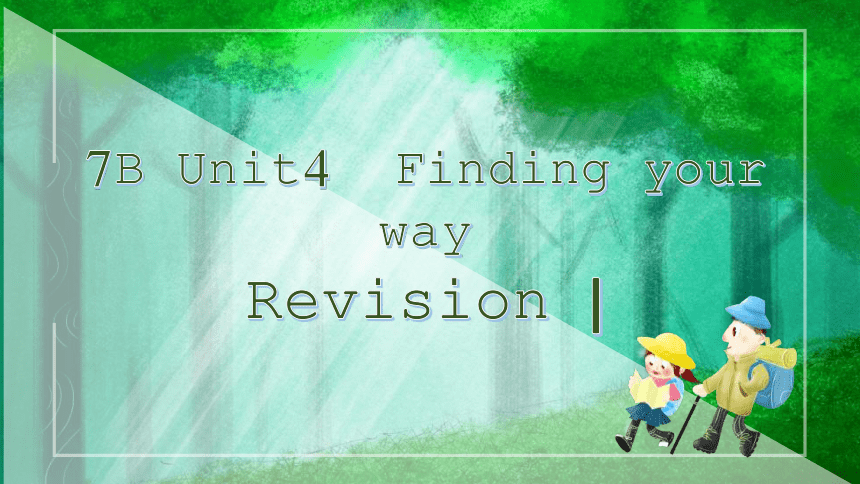 | |
| 格式 | zip | ||
| 文件大小 | 9.8MB | ||
| 资源类型 | 教案 | ||
| 版本资源 | 牛津译林版 | ||
| 科目 | 英语 | ||
| 更新时间 | 2020-05-14 22:37:25 | ||
图片预览


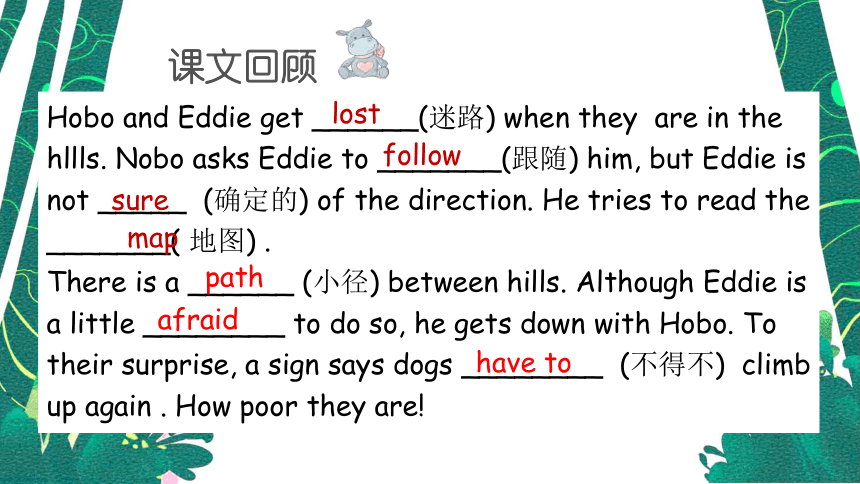

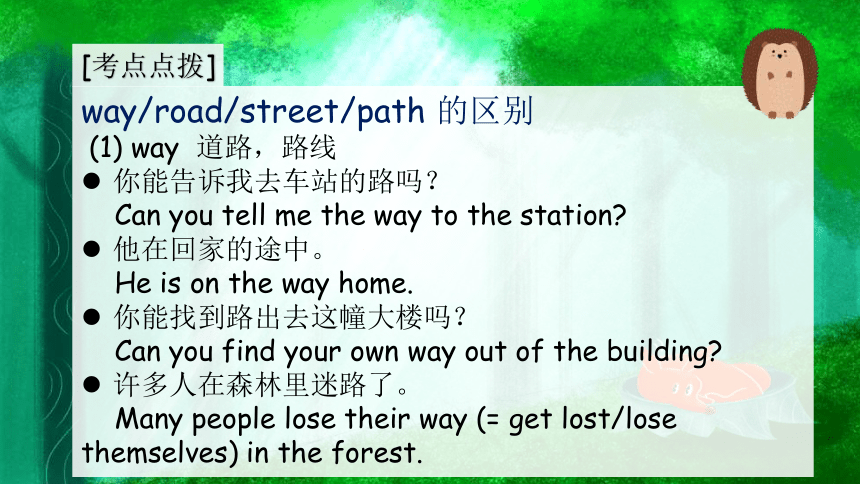
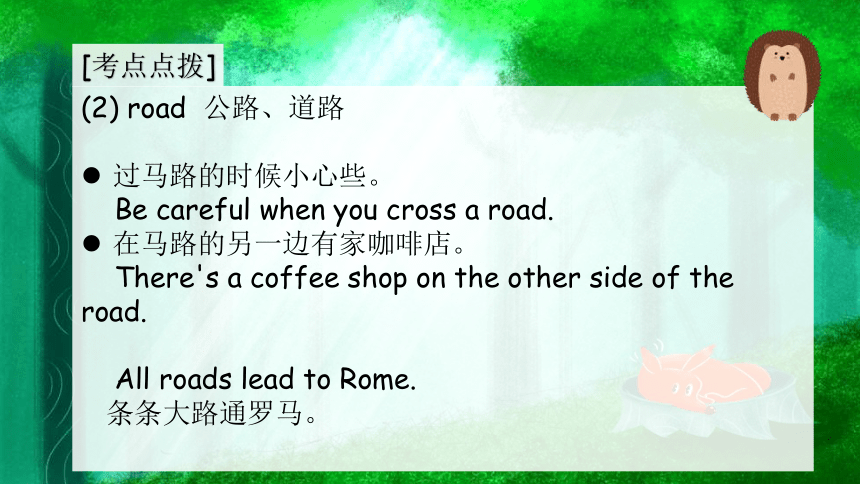

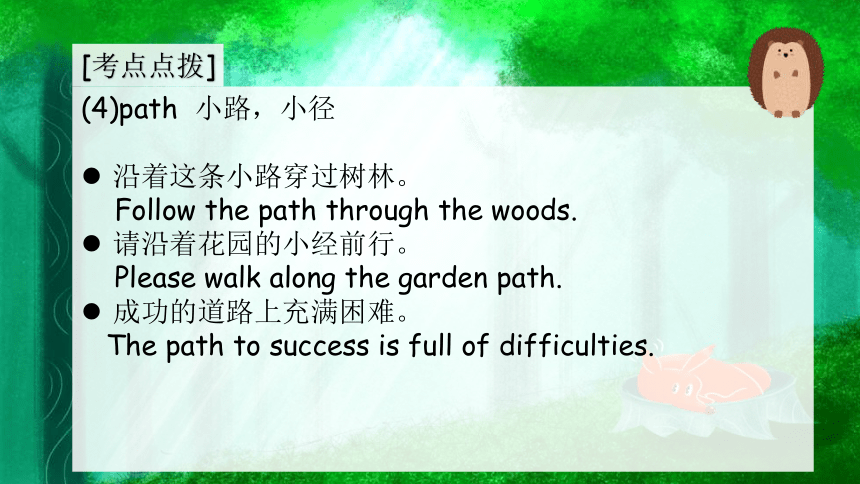
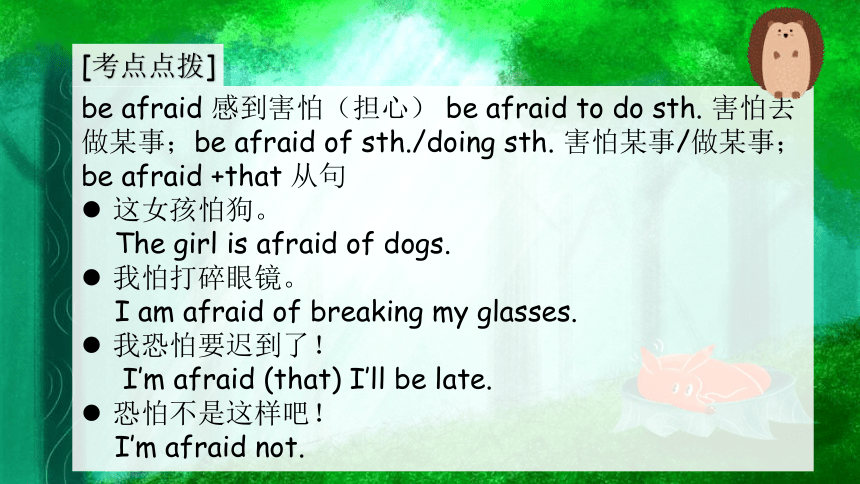
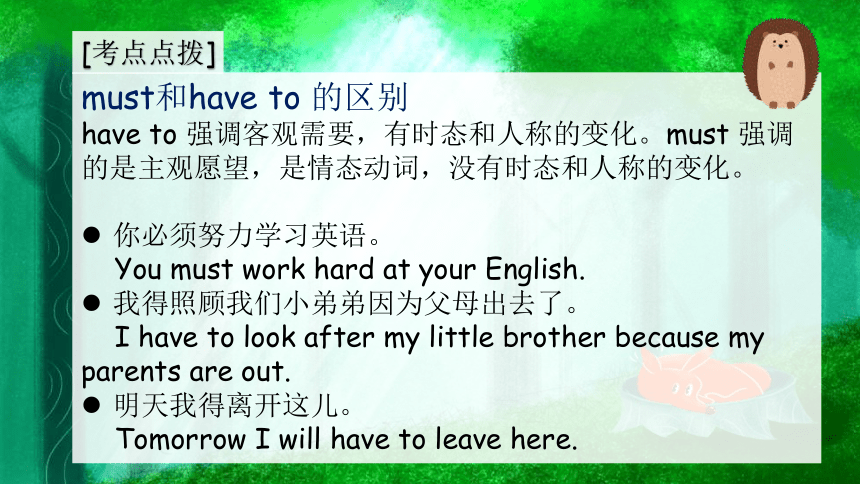
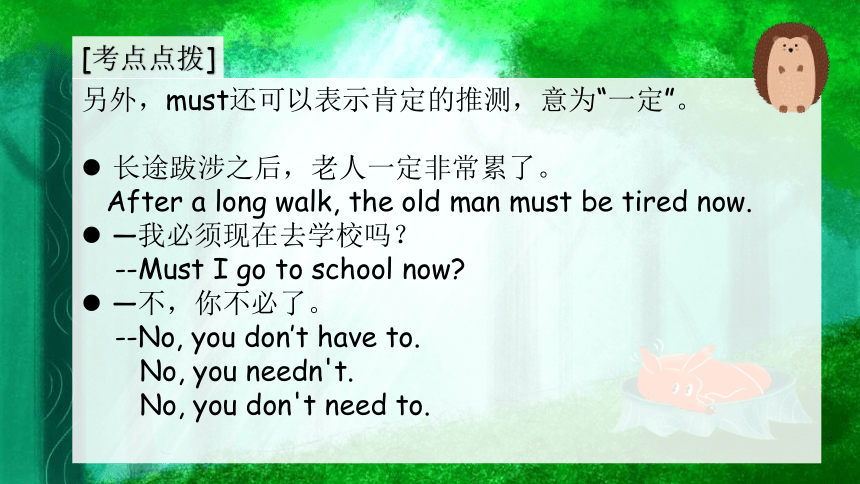
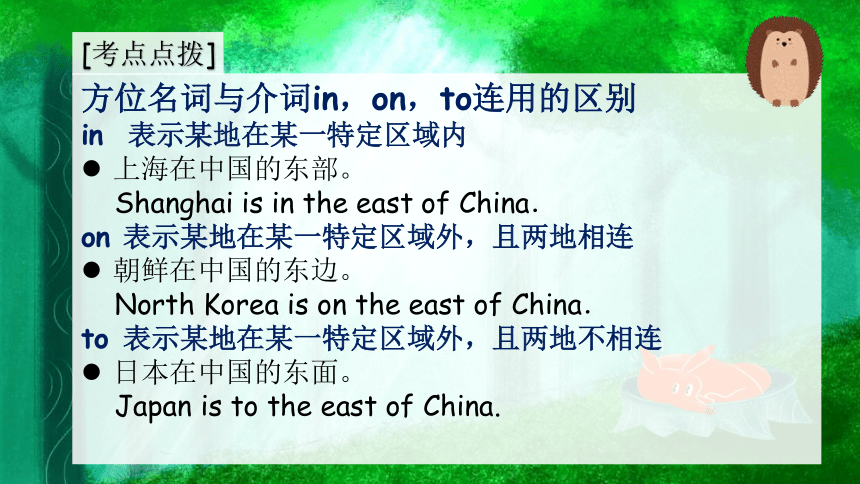
文档简介
(共31张PPT)
7B Unit4 Finding your way
Revision ?
课文回顾
考点点拨
习题检测
Hobo and Eddie get ______(迷路) when they are in the hllls. Nobo asks Eddie to _______(跟随) him, but Eddie is not _____ (确定的) of the direction. He tries to read the _______( 地图) .
There is a ______ (小径) between hills. Although Eddie is a little ________ to do so, he gets down with Hobo. To their surprise, a sign says dogs ________ (不得不) climb up again . How poor they are!
课文回顾
lost
follow
sure
path
afraid
map
have to
follow vt.跟随,遵循
follow sb. = come with/after sb. 跟着某人
她跟着我进了厨房。
She followed me into the kitchen.
我决定遵循她的建议早点睡觉。
I decided to follow her advice and go to bed early.
following adj. 紧跟着的,接下来的
the following week = the coming/next week下周
[考点点拨]
way/road/street/path 的区别
(1) way 道路,路线
你能告诉我去车站的路吗?
Can you tell me the way to the station?
他在回家的途中。
He is on the way home.
你能找到路出去这幢大楼吗?
Can you find your own way out of the building?
许多人在森林里迷路了。
Many people lose their way (= get lost/lose themselves) in the forest.
[考点点拨]
(2) road 公路、道路
过马路的时候小心些。
Be careful when you cross a road.
在马路的另一边有家咖啡店。
There's a coffee shop on the other side of the road.
All roads lead to Rome.
条条大路通罗马。
[考点点拨]
(3) street 街道,马路
在街上踢足球是危险的。
It’s dangerous to play football in the street.
我们女儿住在我们街对面。
Our daughter lives just across the street from us.
过马路的时候确保要两边都看。
Make sure you look both ways when you cross the street.
[考点点拨]
(4)path 小路,小径
沿着这条小路穿过树林。
Follow the path through the woods.
请沿着花园的小经前行。
Please walk along the garden path.
成功的道路上充满困难。
The path to success is full of difficulties.
[考点点拨]
be afraid 感到害怕(担心) be afraid to do sth. 害怕去做某事;be afraid of sth./doing sth. 害怕某事/做某事;be afraid +that 从句
这女孩怕狗。
The girl is afraid of dogs.
我怕打碎眼镜。
I am afraid of breaking my glasses.
我恐怕要迟到了!
I’m afraid (that) I’ll be late.
恐怕不是这样吧!
I’m afraid not.
[考点点拨]
must和have to 的区别
have to 强调客观需要,有时态和人称的变化。must 强调的是主观愿望,是情态动词,没有时态和人称的变化。
你必须努力学习英语。
You must work hard at your English.
我得照顾我们小弟弟因为父母出去了。
I have to look after my little brother because my parents are out.
明天我得离开这儿。
Tomorrow I will have to leave here.
[考点点拨]
另外,must还可以表示肯定的推测,意为“一定”。
长途跋涉之后,老人一定非常累了。
After a long walk, the old man must be tired now.
—我必须现在去学校吗?
--Must I go to school now?
—不,你不必了。
--No, you don’t have to.
No, you needn't.
No, you don't need to.
[考点点拨]
方位名词与介词in,on,to连用的区别
in 表示某地在某一特定区域内
上海在中国的东部。
Shanghai is in the east of China.
on 表示某地在某一特定区域外,且两地相连
朝鲜在中国的东边。
North Korea is on the east of China.
to 表示某地在某一特定区域外,且两地不相连
日本在中国的东面。
Japan is to the east of China.
[考点点拨]
Daniel: Where are we going for our ________?
(班级旅行)
Simon: We're going to Sunshine Zoo.
Daniel: Where's the zoo? Is it
____________ our school?(离开…很远)
Simon: No. It's _______ the school, (在……北部)
about __________________.(3千米远)
Daniel: How will we get there?
Simon: We'll ______________. (乘公车到那里)
课文回顾
class trip
far away from
north of
three kilometres away
get there by bus
trip n. 旅行,旅游
take / have / go on a trip to… 去……的旅行
be on a trip to … 在去……的旅行中
trip /travel/journey/ tour 的区别
(1) trip 指“任何方式的,从事业务或游览的旅行”,往往着重于“短途旅行”
经理出差去了。
The manager went on a business trip.
我喜欢那次去海边的旅行。
I enjoyed our trip to the seaside.
[考点点拨]
(2) travel 指较远距离的旅行,既可作动词,也可作名词。
这是一本关于太空旅行的书。
It is a book about space travel.
他在国外旅行多年之后回来了。
He came home after years of foreign travel.
他喜欢周游世界。
He likes travelling around the world.
traveller 旅行者
[考点点拨]
(3) journey 长距离的旅行
他决定乘飞机去纽约。
He decided to make a journey to New York by air.
到海滨去旅行的路有多远?
How long is the journey to the coast?
他正在计划去中国的六周旅行。
He is planning a six-week journey to China.
[考点点拨]
(4) tour 指“以游览,视察、购物等为目的旅行”,常含有“最后回到原出发点”的意思。
他要周游全球。
He is going to make a round-the –world tour.
我们游览了一下这座城市。
We went on a tour of the city.
tour guide 导游 tourist 游客
[考点点拨]
Here we're__________( 在……前面) the South Gate. ____________(一直走), and you'll find the Panda House. Pandas are cute. They like to __________(吃竹子) and _______________(整天躺着). Every year, lots of visitors come here to see them.
________________(沿着这条路一直走). To the north of the Panda House, you'll find the lions. Lions are __________(……的国王) the animal world._________ (记住)that they're dangerous. Never go near them.
课文回顾
in front of
Go straight on
eat bamboo
lie down all day long
Walk along the road
the kings of
Remember
Turn left, and _____________(在……西面) the Lions' Area, you'll find the World of Birds. Birds __________________ (发出优美的声音) when they sing. ______________(在……北面) the World of Birds is the Monkeys' Forest. Monkeys are ______________(聪明又有趣). They're always ____________(上蹿下跳). They ________________(逗人们发笑).
课文回顾
to the west of
make beautiful sounds
clever and funny
jumping around
make people laugh
To the north of
Then _________(右转), and to the east of the Monkeys' Forest, you'll see the giraffes. They're quite tall. Their _________(长脖子) help them eat the leaves from trees. _____________________(在长颈鹿的东北)there's a bridge. ______________(过桥), and you'll see the elephants. Their large ears _______________(像打开的扇子).
Here you can see __________(各种各样的) animals. Have a nice trip!
课文回顾
turn right
long necks
North-east of the giraffes
Cross the bridge
are like open fans
all kinds of
laugh vi. 笑,大笑 laugh at… 嘲笑……
孩子们正又跳又笑。
The children are jumping and laughing.
嘲笑别人是不礼貌的。
It’s not polite to laugh at others.
smile 微笑 smile at… 朝……微笑
老师微笑着说,“你是个好孩子”。
The teacher smiled and said, “You are a good boy.”
她的脸上露出了灿烂的微笑。
There is a big smile on her face.
[考点点拨]
cross vt. 穿过,横过;n. 十字形,十字形东西
crossing n. 人行横道;十字路口
一个年轻人帮助那个老人过了马路。
A young man helped the old man cross the street.
红灯亮时不要过马路。
Don't cross the street when the red light is on.
在每个错误的答案的后面画叉。
Put a cross after each wrong answer.
cross one's fingers 祈祷
[考点点拨]
cross /across/through 的区别
(1)cross 及物动词
过马路前要左右看看。
Look right and left before you cross the street.
(2) across 介词,表示“横过”之意,即到达一条河、一条街的另一侧。
看,他们正在过马路。
Look! They are walking across the road.
小男孩最后游过了这条大河。
The little boy swam across the big river in the end.
[考点点拨]
(3) through 介词,表示动作发生在立体空间内,
是从内部穿过,即穿过洞口、树林等。
He is walking through the forest.
他正穿过树林。
The elephant can’t go through the door.
大象从这道门里走不过去。
[考点点拨]
sound/noise/voice 的区别
sound 作“声音”解,可以指一切声音。sound 还可作连系动词,意为“听起来”。
你的主意听起来不错。
Your idea sounds a good one.
光速比声速快。
Light travels faster than sound.
他听到背后有一个奇怪的声音。
He heard a strange sound from behind.
你能把电视机的声音关小/开大吗?
Could you turn the sound down/up on the TV?
[考点点拨]
noise 意为“噪声,指不悦耳的嘈杂噪音
不要那么吵闹。
Don’t make so much noise.
noisy adj. 吵闹的 nosily adv. 吵闹地
voice 指人说话或唱歌发出的声音
她有一幅好嗓子,她歌唱得好。
She has a good voice and she sings well.
我不得不提高自己的嗓音来让自己的声音盖过噪音。
I had to raise my voice to make myself heard over the noise.
[考点点拨]
remember vt. 记得,记住
remember sb./ sth. 记得某人/某事
remember to do sth. 记住要做某事 (这件事还没有做)
remember doing sth. 记得做过某事 (这件事已做过)
我可以记住人们的脸孔但是记不住他们的名字。
I can remember people's faces, but not their names.
走之前记住锁门。
Remember to lock the door before you leave.
她记得在哪儿见过此人。
She remembers seeing the man somewhere.
类似的结构还有: forget to do sth. 忘记去做某事 forget doing sth. 忘记曾做某事了
[考点点拨]
1.Take a map with you, ______ get lost.
A. and you’ll B. or you’ll C. and you D. or you
2.Elephants ______cute. Their large ears ______ open fans.
A. look;look B. look like;look
C. look;look like D.look like;look like
3.More and more people now go to work ______their cars.
A. by B. on C. with D. in
4.Lake Park is ______ from our neighbourhood.
A. five kilometers away B. five kilometers far away
C. far five kilometers away D. away far
[单项选择]
5.--We are going to Sunshine Zoo for our class trip. --____________.
A. You’re welcome B. Not at all
C. That’s right D. Have a nice trip
6.Tom’s father _____ get up early because he drives a car to work.
A. have to B. hasn’t to
C. needn’t have to D. doesn’t have to
7.Shanghai lies_____ the east of China and _____the northeast of Guangdong.
A. in; to B. in; in C. to; to D. to; in
8.There is a dog lying on the ground_____ the bus stop_____ the left.
A. in front of; in B. in the front of; in
C. in front of; on D. in the front of; on
[实践运用]
Homework
Complete the exercises
Review the conversations and the text
Thank you
7B Unit4 Finding your way
Revision ?
课文回顾
考点点拨
习题检测
Hobo and Eddie get ______(迷路) when they are in the hllls. Nobo asks Eddie to _______(跟随) him, but Eddie is not _____ (确定的) of the direction. He tries to read the _______( 地图) .
There is a ______ (小径) between hills. Although Eddie is a little ________ to do so, he gets down with Hobo. To their surprise, a sign says dogs ________ (不得不) climb up again . How poor they are!
课文回顾
lost
follow
sure
path
afraid
map
have to
follow vt.跟随,遵循
follow sb. = come with/after sb. 跟着某人
她跟着我进了厨房。
She followed me into the kitchen.
我决定遵循她的建议早点睡觉。
I decided to follow her advice and go to bed early.
following adj. 紧跟着的,接下来的
the following week = the coming/next week下周
[考点点拨]
way/road/street/path 的区别
(1) way 道路,路线
你能告诉我去车站的路吗?
Can you tell me the way to the station?
他在回家的途中。
He is on the way home.
你能找到路出去这幢大楼吗?
Can you find your own way out of the building?
许多人在森林里迷路了。
Many people lose their way (= get lost/lose themselves) in the forest.
[考点点拨]
(2) road 公路、道路
过马路的时候小心些。
Be careful when you cross a road.
在马路的另一边有家咖啡店。
There's a coffee shop on the other side of the road.
All roads lead to Rome.
条条大路通罗马。
[考点点拨]
(3) street 街道,马路
在街上踢足球是危险的。
It’s dangerous to play football in the street.
我们女儿住在我们街对面。
Our daughter lives just across the street from us.
过马路的时候确保要两边都看。
Make sure you look both ways when you cross the street.
[考点点拨]
(4)path 小路,小径
沿着这条小路穿过树林。
Follow the path through the woods.
请沿着花园的小经前行。
Please walk along the garden path.
成功的道路上充满困难。
The path to success is full of difficulties.
[考点点拨]
be afraid 感到害怕(担心) be afraid to do sth. 害怕去做某事;be afraid of sth./doing sth. 害怕某事/做某事;be afraid +that 从句
这女孩怕狗。
The girl is afraid of dogs.
我怕打碎眼镜。
I am afraid of breaking my glasses.
我恐怕要迟到了!
I’m afraid (that) I’ll be late.
恐怕不是这样吧!
I’m afraid not.
[考点点拨]
must和have to 的区别
have to 强调客观需要,有时态和人称的变化。must 强调的是主观愿望,是情态动词,没有时态和人称的变化。
你必须努力学习英语。
You must work hard at your English.
我得照顾我们小弟弟因为父母出去了。
I have to look after my little brother because my parents are out.
明天我得离开这儿。
Tomorrow I will have to leave here.
[考点点拨]
另外,must还可以表示肯定的推测,意为“一定”。
长途跋涉之后,老人一定非常累了。
After a long walk, the old man must be tired now.
—我必须现在去学校吗?
--Must I go to school now?
—不,你不必了。
--No, you don’t have to.
No, you needn't.
No, you don't need to.
[考点点拨]
方位名词与介词in,on,to连用的区别
in 表示某地在某一特定区域内
上海在中国的东部。
Shanghai is in the east of China.
on 表示某地在某一特定区域外,且两地相连
朝鲜在中国的东边。
North Korea is on the east of China.
to 表示某地在某一特定区域外,且两地不相连
日本在中国的东面。
Japan is to the east of China.
[考点点拨]
Daniel: Where are we going for our ________?
(班级旅行)
Simon: We're going to Sunshine Zoo.
Daniel: Where's the zoo? Is it
____________ our school?(离开…很远)
Simon: No. It's _______ the school, (在……北部)
about __________________.(3千米远)
Daniel: How will we get there?
Simon: We'll ______________. (乘公车到那里)
课文回顾
class trip
far away from
north of
three kilometres away
get there by bus
trip n. 旅行,旅游
take / have / go on a trip to… 去……的旅行
be on a trip to … 在去……的旅行中
trip /travel/journey/ tour 的区别
(1) trip 指“任何方式的,从事业务或游览的旅行”,往往着重于“短途旅行”
经理出差去了。
The manager went on a business trip.
我喜欢那次去海边的旅行。
I enjoyed our trip to the seaside.
[考点点拨]
(2) travel 指较远距离的旅行,既可作动词,也可作名词。
这是一本关于太空旅行的书。
It is a book about space travel.
他在国外旅行多年之后回来了。
He came home after years of foreign travel.
他喜欢周游世界。
He likes travelling around the world.
traveller 旅行者
[考点点拨]
(3) journey 长距离的旅行
他决定乘飞机去纽约。
He decided to make a journey to New York by air.
到海滨去旅行的路有多远?
How long is the journey to the coast?
他正在计划去中国的六周旅行。
He is planning a six-week journey to China.
[考点点拨]
(4) tour 指“以游览,视察、购物等为目的旅行”,常含有“最后回到原出发点”的意思。
他要周游全球。
He is going to make a round-the –world tour.
我们游览了一下这座城市。
We went on a tour of the city.
tour guide 导游 tourist 游客
[考点点拨]
Here we're__________( 在……前面) the South Gate. ____________(一直走), and you'll find the Panda House. Pandas are cute. They like to __________(吃竹子) and _______________(整天躺着). Every year, lots of visitors come here to see them.
________________(沿着这条路一直走). To the north of the Panda House, you'll find the lions. Lions are __________(……的国王) the animal world._________ (记住)that they're dangerous. Never go near them.
课文回顾
in front of
Go straight on
eat bamboo
lie down all day long
Walk along the road
the kings of
Remember
Turn left, and _____________(在……西面) the Lions' Area, you'll find the World of Birds. Birds __________________ (发出优美的声音) when they sing. ______________(在……北面) the World of Birds is the Monkeys' Forest. Monkeys are ______________(聪明又有趣). They're always ____________(上蹿下跳). They ________________(逗人们发笑).
课文回顾
to the west of
make beautiful sounds
clever and funny
jumping around
make people laugh
To the north of
Then _________(右转), and to the east of the Monkeys' Forest, you'll see the giraffes. They're quite tall. Their _________(长脖子) help them eat the leaves from trees. _____________________(在长颈鹿的东北)there's a bridge. ______________(过桥), and you'll see the elephants. Their large ears _______________(像打开的扇子).
Here you can see __________(各种各样的) animals. Have a nice trip!
课文回顾
turn right
long necks
North-east of the giraffes
Cross the bridge
are like open fans
all kinds of
laugh vi. 笑,大笑 laugh at… 嘲笑……
孩子们正又跳又笑。
The children are jumping and laughing.
嘲笑别人是不礼貌的。
It’s not polite to laugh at others.
smile 微笑 smile at… 朝……微笑
老师微笑着说,“你是个好孩子”。
The teacher smiled and said, “You are a good boy.”
她的脸上露出了灿烂的微笑。
There is a big smile on her face.
[考点点拨]
cross vt. 穿过,横过;n. 十字形,十字形东西
crossing n. 人行横道;十字路口
一个年轻人帮助那个老人过了马路。
A young man helped the old man cross the street.
红灯亮时不要过马路。
Don't cross the street when the red light is on.
在每个错误的答案的后面画叉。
Put a cross after each wrong answer.
cross one's fingers 祈祷
[考点点拨]
cross /across/through 的区别
(1)cross 及物动词
过马路前要左右看看。
Look right and left before you cross the street.
(2) across 介词,表示“横过”之意,即到达一条河、一条街的另一侧。
看,他们正在过马路。
Look! They are walking across the road.
小男孩最后游过了这条大河。
The little boy swam across the big river in the end.
[考点点拨]
(3) through 介词,表示动作发生在立体空间内,
是从内部穿过,即穿过洞口、树林等。
He is walking through the forest.
他正穿过树林。
The elephant can’t go through the door.
大象从这道门里走不过去。
[考点点拨]
sound/noise/voice 的区别
sound 作“声音”解,可以指一切声音。sound 还可作连系动词,意为“听起来”。
你的主意听起来不错。
Your idea sounds a good one.
光速比声速快。
Light travels faster than sound.
他听到背后有一个奇怪的声音。
He heard a strange sound from behind.
你能把电视机的声音关小/开大吗?
Could you turn the sound down/up on the TV?
[考点点拨]
noise 意为“噪声,指不悦耳的嘈杂噪音
不要那么吵闹。
Don’t make so much noise.
noisy adj. 吵闹的 nosily adv. 吵闹地
voice 指人说话或唱歌发出的声音
她有一幅好嗓子,她歌唱得好。
She has a good voice and she sings well.
我不得不提高自己的嗓音来让自己的声音盖过噪音。
I had to raise my voice to make myself heard over the noise.
[考点点拨]
remember vt. 记得,记住
remember sb./ sth. 记得某人/某事
remember to do sth. 记住要做某事 (这件事还没有做)
remember doing sth. 记得做过某事 (这件事已做过)
我可以记住人们的脸孔但是记不住他们的名字。
I can remember people's faces, but not their names.
走之前记住锁门。
Remember to lock the door before you leave.
她记得在哪儿见过此人。
She remembers seeing the man somewhere.
类似的结构还有: forget to do sth. 忘记去做某事 forget doing sth. 忘记曾做某事了
[考点点拨]
1.Take a map with you, ______ get lost.
A. and you’ll B. or you’ll C. and you D. or you
2.Elephants ______cute. Their large ears ______ open fans.
A. look;look B. look like;look
C. look;look like D.look like;look like
3.More and more people now go to work ______their cars.
A. by B. on C. with D. in
4.Lake Park is ______ from our neighbourhood.
A. five kilometers away B. five kilometers far away
C. far five kilometers away D. away far
[单项选择]
5.--We are going to Sunshine Zoo for our class trip. --____________.
A. You’re welcome B. Not at all
C. That’s right D. Have a nice trip
6.Tom’s father _____ get up early because he drives a car to work.
A. have to B. hasn’t to
C. needn’t have to D. doesn’t have to
7.Shanghai lies_____ the east of China and _____the northeast of Guangdong.
A. in; to B. in; in C. to; to D. to; in
8.There is a dog lying on the ground_____ the bus stop_____ the left.
A. in front of; in B. in the front of; in
C. in front of; on D. in the front of; on
[实践运用]
Homework
Complete the exercises
Review the conversations and the text
Thank you
